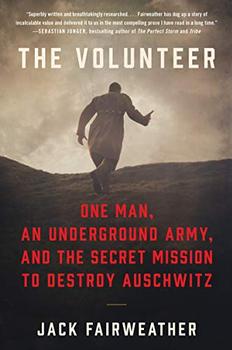Summary | Excerpt | Reading Guide | Reviews | Read-Alikes | Genres & Themes | Author Bio

The True Story of Three Men Who Defied the Nazis, Saved 1,200 Jews, and Built a Village in the Forest
by Peter DuffyThe inspiring and harrowing true story of three brothers who established a hidden base camp in the Belorussian forest eluding the Nazi's extensive efforts to capture them. In July 1944, after two and a half years in the woods, more than one thousand Jewish men, women and children, emerged from the woods triumphant and alive.
It is one of the most remarkable dramas of World War II -- untold until now.
In 1941, three young men -- brothers, sons of a miller -- witnessed their parents and two other siblings being led away to their eventual murders. It was a grim scene that would, of course, be repeated endlessly throughout the war. What makes this particular story of interest is how the survivors responded. Instead of running or capitulating or giving in to despair, these brothers -- Tuvia, Zus, and Asael Bielski -- did something else entirely. They fought back, waging a guerrilla war of wits and cunning against both the Nazis and the pro-Nazi sympathizers. Along the way they saved well over a thousand Jewish lives.
Using their intimate knowledge of the dense forests surrounding the Belorussian towns of Novogrudek and Lida, the Bielskis evaded the Nazis and established a hidden base camp, then set about convincing other Jews to join their ranks. When the Nazis began systematically eliminating the local Jewish populations -- more than ten thousand were killed in the first year of the Nazi occupation alone -- the Bielskis intensified their efforts, often sending fighting men into the ghettos to escort Jews to safety. As more and more Jews arrived each day, a robust community began to emerge, a "Jerusalem in the woods." They slept in camouflaged dugouts built into the ground. Lovers met, were married, and conceived children. The community boasted a synagogue, a bathhouse, a theater, and cobblers so skilled that Russian officers would wait in line to have their boots reshod.
But as its notoriety grew, so too did the Nazi efforts to capture the rugged brothers; and on several occasions they came so near to succeeding that the Bielskis had to abandon the camp and lead their massive entourage to newer, safer locations. And while some argued in favor of a smaller, more mobile unit, focused strictly on waging battle against the Germans, Tuvia Bielski was firm in his commitment to all Jews. "I'd rather save one old Jewish woman," he said, "than kill ten Nazis."
In July 1944, after two and a half years in the woods, the Bielskis learned that the Germans, overrun by the Red Army, were retreating back toward Berlin. More than one thousand Bielski Jews emerged -- alive -- on that final, triumphant exit from the woods.
The Bielski Brothers is a dramatic and heartfelt retelling of a story of the truest heroism, a historic testament to courage in the face of unspeakable adversity.
 Howard Blum, author of The Brigade
An exciting, well-paced story about honor, courage and duty. An inspiration.
Howard Blum, author of The Brigade
An exciting, well-paced story about honor, courage and duty. An inspiration. Paula Zahn, CNN Live from the Headlines
Powerful! The strength of the human spirt shines on in [this] beautifully written book.
Paula Zahn, CNN Live from the Headlines
Powerful! The strength of the human spirt shines on in [this] beautifully written book.
If you liked The Bielski Brothers, try these:

by Jack Fairweather
Published 2020
Winner of the Costa Book of the Year Award. The incredible true story of a Polish resistance fighter's infiltration of Auschwitz to sabotage the camp from within, and his daring escape to warn the Allies about the Nazis' true plans for a "Final Solution."

by Claude Lanzmann
Published 2013
In these pages, Lanzmann composes a hymn to life that flows from memory yet has the rhythm of a novel, as tumultuous as it is energetic.